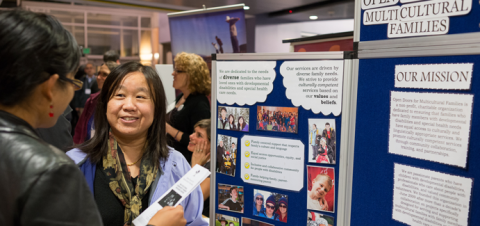Image

Tony To, Executive Director, HomeSight
Challenge: Low-income communities and those populated with people of color are often excluded from government planning and when growth comes to these neighborhoods it benefits wealthier new residents and harms long-term residents and businesses. Rising costs and the loss of culturally relevant services often drive these residents from their own neighborhoods.
To promote equitable growth in the greater Seattle region, HomeSight organized a collaborative in 2010 that advocated for a race and social equity focus in the region's Sustainable Communities Planning grant from the U.S. Department of Housing and Urban Development. Known as the Growing Transit Communities (GTC) program, the grant supported a regional process to plan development around the area's light rail system, which had just opened with one central line in 2009 and other rapid transit. HomeSight secured 15 percent or $750,000 of the $5 million award to create, organize and staff the Puget Sound Regional Equity Network (REN) to engage a broad range of community members and drive community-led, equitable strategies for transit-oriented development.
Puget Sound Regional Equity Network and the influence it had on the transit planning program became a national model for resourcing and structuring equitable growth efforts. Putting equity at the center of the process meant that, instead of the usual planning processes where community members are relegated to one committee, we shifted the structure so that every committee had community representation. REN members were also placed in leadership positions. Tony To, REN co-chair and HomeSight's executive director, served as vice chair of the program and network members served on committees that developed equitable transit-oriented development strategies. Through this structure, race and social equity perspectives were threaded throughout all conversations instead of being relegated to one space outside of the major discussions.
The Puget Sound Regional Equity Network grew into a cross-sector coalition of 40 community-based organizations in three counties engaged in health, housing, community development, youth organizing and small business organizing. The network developed a vision statement and set of principles that provided a foundation for many of the transit-oriented development strategies adopted by the GTC program partners to guide equitable development around light rail.
 Broad community engagement and organizing were key strategies used by the network to identify community assets, equity concerns and community-driven solutions. In addition to securing community representation in all aspects of the planning program, the network developed an innovative Equity Grant Program and organized the first Puget Sound Equity Summit to support broad community conversation and engagement in the GTC program.
Broad community engagement and organizing were key strategies used by the network to identify community assets, equity concerns and community-driven solutions. In addition to securing community representation in all aspects of the planning program, the network developed an innovative Equity Grant Program and organized the first Puget Sound Equity Summit to support broad community conversation and engagement in the GTC program.The REN Equity Grant Program didn't simply bring new voices to the planning table, it changed the entire concept of what constitutes the planning table; especially when contrasted with typical planning processes that seek engagement solely through formal public meetings which are often one-way communications. Instead, the network built relationships with community-based organizations and, through small grants, supported the work these organizations were already doing to advance race and social equity in their communities. REN invested $450,000 through small grants of $5,000 to $15,000 to 29 community-based organizations working along the transit corridors in King, Pierce and Snohomish counties on a range of organizing, research and outreach projects. By building these relationships with community-based organizations, supporting the work they were already doing and connecting them with a broader network, we fostered deeper conversations about the real issues communities face, highlighted community-led approaches and identified needed resources and strategies. The grant investments leveraged an additional $574,500 in community resources.
Puget Sound Regional Equity Network organized the first Puget Sound Equity Summit in November 2013, which brought together more than 400 community members, policymakers, public agency staff, philanthropists and other stakeholders to share strategies and connect with other organizing efforts. It identified cross-sector equity issues and efforts throughout the region including education, jobs, housing, health, transportation, environment, safety, youth concerns and preventing displacement.
By shifting the structure of the planning process, redefining the planning table and providing community grants and spaces for connecting, REN met low-income and people of color communities where they were and effectively opened the planning process to their perspectives. As a result of this holistic and inclusive framework, race and social equity is central to a set of 200 strategies that were adopted to guide equitable development along transit corridors.
In addition, the network's work with GTC partners and jurisdictions has resulted in:
- A new Regional Equitable Development Initiative Fund that will provide financing for land acquisition around light rail to preserve or develop affordable housing and community anchors.
- A new requirement passed by the state legislature requiring development of affordable housing on transit agency properties at light rail stations.
- The development of an equity analysis in the City of Seattle's Comprehensive Plan update.
- Planning processes can fully include of people of color and low-income communities by providing resources and creating a structure that supports community engagement.
- Full inclusion changes outcomes. Instead of typical planning recommendations focused solely on physical infrastructure needs, the REN process put people at the center and resulted in strategies that will create opportunities in communities.

